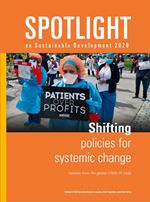Social Watch E-Newsletter - Issue 367 - November 10, 2020
Published on Tue, 2020-11-10 17:11
 |
|
Issue 367 - November 10, 2020
|
|
|
Social Watch reports
Spotlight report on the 2030 Agenda
|
|
|
| |
|
| |
Jordan: Protests get results
|
| |
|
| |
The numerous recent protests in Jordan achieved sustainable social and economic improvements in terms of better wages, working conditions and the dismantling of unjust regulations.
As a result of longstanding failures in dealing with internal and external challenges, and in particular conditionalities imposed by IMF loans, Jordan has faced a large series of social and political protests in recent years. In the wake of increasing deteriorations of the economic situation, the demonstrations have received an enormous upswing and received public support from all segments of society.
The alternative report on Jordan, prepared by the Phenix Center for Economic Studies, describes the dynamics and the leading role of Civil Society Organizations (CSOs) during the demonstrations, and takes a look at the aftermath of the protests and upcoming challenges. Read more
|
| |
|
| |
|
| |
Finland: Social security with inequalities and big footprint
|
| |
|
| |
|

|
There is no extreme poverty in Finland and a comprehensive social security covers the whole population. Still there are challenges in relation to poverty and inequality, says the alternative report of Fingo, the coalition of Finnish Development NGOs. A crucial problem is that the increase in inequalities and social exclusion seem to accumulate and extend across generations, causing intergenerational transmission of poverty.
The biggest challenge of Finland is the consumption of raw materials. It is high in relation to gross domestic product and per capita, the highest in the world. Total energy consumption was 1.38 million terajoules in 2018, and 40 per cent of fossil fuels. Finland’s economy produced 0.21 kg of carbon dioxide per EUR 1 of GDP, more than double that of Sweden or Switzerland. The average material footprint among Finns is over 40 000 kg per person a year, and the trend is rising. The accounting of greenhouse gas emissions does not consider the impact of Finnish consumption beyond its national borders. Read more
|
| |
|
| |
|
| |
Re-value the importance of care in society
|
| |
|
| |
|

|
By Corina Rodríguez Enríquez – DAWN
Feminist organizations have insisted for decades on the importance of recognizing the systemic role of care work. This invisible work is indispensable for reproducing the labour force and more broadly for sustaining life. The COVID-19 pandemic has transformed this feminist message into an accepted truth.
All of us face the risk of catching a disease that can kill us. To avoid contagion, we need to take care of ourselves, but we also depend on the whole of society adopting habits of caring. If we get sick, we need the specialized care of people who work in the health sector, but also daily care to meet the daily needs of existence.
Most of the strategies adopted to confront the pandemic, based on physical distancing and social isolation, along with “stay at home” guidelines, have been possible because "at home" there is the regular provision of domestic and care unpaid work that reproduces life on a daily basis. With the closure of schools and of daycare facilities for dependent persons, unpaid domestic and care work in households has increased. Read more
|
| |
|
| |
Social Watch publishes country reports 2020
COVID-19 is a global catastrophe, pre-existing injustices aggravate the impact of the virus and without strong intervention from the State, the existing imbalances are reinforced. Civil society organizations around the world are monitoring the impact of COVID-19 and reclaiming the streets, with revitalized leadership and a rainbow of demands that combine old and new issues. “Back to normal” is not possible nor desirable. This is the main message emerging from independent civil society reports on the implementation of the 2030 Agenda and its Sustainable Development Goals.
The Social Watch network has been publishing since 1996 regular reports on how governments implement their international commitments to eradicate poverty and achieve gender equality within planetary boundaries.
|
| |
|
| |
|
| |
UN Reform on the agenda in its 75th year
|
| |
|
| |
By Elena Marmo
Following the opening of the 75th Session of the UN General Assembly (UNGA) and a series of High-level meetings and events parallel to the General Debate, the UNGA plenary and committees have shifted to a pattern wherein the Member States debate and negotiate resolutions on a range of topics.
Across the UNGA agenda, priorities include COVID-19 recovery, the UN Decade of Action--the final 10 years to achieve the Sustainable Development Goals (SDGs) ---and the call for necessary reforms for the UN to be effective across management, peace and security and development. Reform to the UN Development System (UNDS) will be a prime agenda item of the UNGA Economic and Finance (Second) Committee negotiations, with an outcome resolution of its Quadrennial Comprehensive Policy Review (QCPR) expected in November or December. Read more
|
| |
|
| |
|
| |
Social Watch 2020 Report Highlights Czech Failings On Human Rights and Sustainable Development
|
| |
|
| |
|

|
The Czech Republic is failing to meet many of the UN sustainable development targets, with progress only visible in certain areas, according to a report from Social Watch Czech Republic, a non-governmental organization that monitors compliance with the goals. The report is divided into five sections: people, planet, prosperity, peace, and partnership, with each section assessing the country’s progress in meeting the goals agreed by UN member states in 2015. During the COVID-19 pandemic, the state introduced special measures such as nursing care for the self-employed, which the report argues should be continued after the end of the pandemic. The Czech Social Watch report concludes that “the lack of perspective of our politicians and officials must be replaced by improvisation from citizens: we plant trees, collect water, sew facemasks, and sort our trash. Of course, this won’t be possible without the involvement of the people. But for real change, we need those who we pay to do their job better.” Read more
|
| |
|
|
|
| |
|
SOCIAL WATCH IS AN INTERNATIONAL NGO WATCHDOG NETWORK MONITORING POVERTY ERADICATION AND GENDER EQUALITY Social Watch >>
Social Watch E-Newsletter
For comments, sugestions, collaborations contact us at:
socwatch@socialwatch.org
To stop receiving this newsletter send a message with the subject "unsubscribe" to:
socwatch@socialwatch.org |
|
|
|
SUSCRIBIRSE A NUESTRO BOLETÍN
Enviar
|
